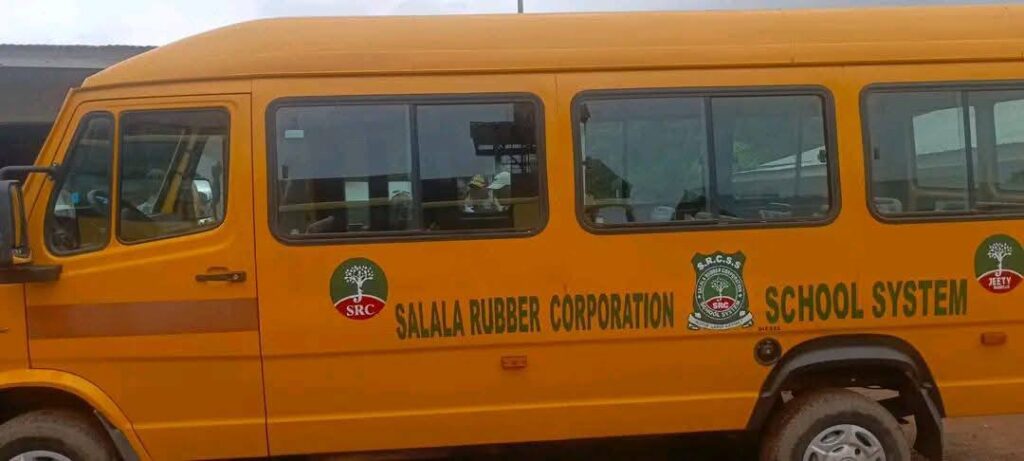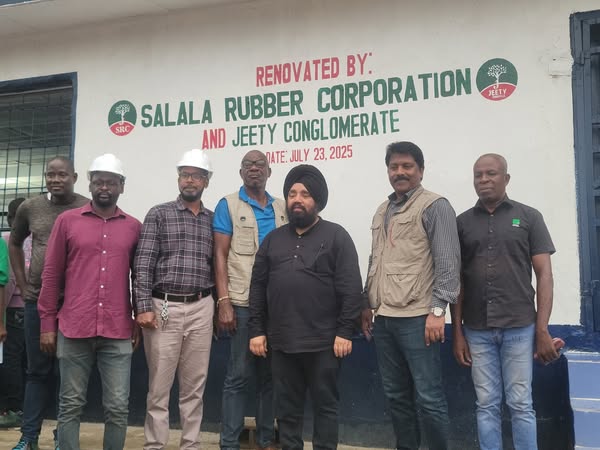Baypolu, Margibi County – In a move that blends corporate responsibility with community development, Indian businessman Upjit Singh Sachdeva, commonly known as Jeety, has unveiled a set of strategic interventions aimed at transforming the living conditions of workers and residents within the Salala Rubber Corporation (SRC) concession area.
On Wednesday, Jeety, who acquired SRC just six months ago under his company Jeety Rubber LLC, officially handed over a fully equipped Toyota Land Cruiser ambulance, a school mini-bus, and a newly renovated town hall to the residents of Baypolu and surrounding plantation villages. The gesture is part of a broader development agenda he has promised to implement across District #5 in Margibi County.
Multi-Sector Impact: Health, Education, and Safety

At the heart of this intervention is a clear effort to address systemic challenges facing the plantation communities, particularly in healthcare and education.
The donated ambulance, fitted for emergency referrals, will serve the SRC Health Center and is expected to provide 24-hour medical response services for plantation workers and nearby residents. Jeety emphasized that operational logistics for round-the-clock use are being finalized, indicating his intent to institutionalize emergency health support in an area that has long suffered from inadequate access to critical care.
Complementing the health intervention is the provision of a mini school bus, intended to transport children of SRC workers from remote villages to the SRC High School. Education access remains a significant barrier in Liberia’s rural sectors, and such logistical support directly reduces dropout rates and improves attendance—especially among girls, who are often more vulnerable to long school commutes.
Additionally, 58 solar streetlights have been installed across several plantation villages, a move designed to improve community safety and extend productive hours for residents. The use of solar technology suggests a sustainable approach to development, in contrast to the limited and inconsistent national power grid coverage in rural Liberia.
A Broader Development Philosophy
Jeety’s approach to community engagement goes beyond mere philanthropy—it reflects a deliberate corporate social responsibility (CSR) strategy rooted in long-term impact. Since taking over SRC, Jeety said his company has already renovated housing in Camps One and Two, with plans underway to upgrade seven additional camps.
“This is just the beginning,” Jeety stated at the handover ceremony. “The ambulance will have a 24-hour response crew, and modalities will be worked on for its operation. My goal is not just to improve the business, but to improve the lives of the people who make it work.”
Such language positions Jeety’s business operations not as extractive, but developmental—a stark departure from the historical narrative around Liberia’s concession sector, where companies have often been criticized for neglecting the welfare of host communities.
Community Leaders Applaud, Set Expectations

Gibi District’s Paramount Chief, speaking on behalf of the local leadership, praised Jeety’s contributions as “timely and necessary,” noting that the intervention addresses long-standing issues that previous management had failed to resolve.
“This is not just corporate benevolence,” he said. “It is leadership—responsive, visible, and people-centered. And for that, we pledge our support moving forward.”
His comments reflect a growing sentiment in Liberia that successful foreign investment must be tied to local empowerment and tangible community benefit. With Liberia’s concession history marred by accusations of exploitation and neglect, Jeety’s early actions set a different tone.
Implications for Concession Management in Liberia
Analysts observing Liberia’s investment landscape argue that initiatives like those at SRC could reshape public expectations and government policy around concession agreements. Rather than seeing corporate operations as isolated from public welfare, such partnerships can become vehicles for social progress, especially in underdeveloped districts.
If sustained, Jeety’s model could serve as a blueprint for inclusive concession management—where profit-making is balanced with genuine, measurable contributions to the socio-economic wellbeing of host communities. In doing so, SRC under Jeety’s leadership might not only revitalize a struggling rubber operation, but also restore faith in Liberia’s capacity for ethical and effective corporate development.



